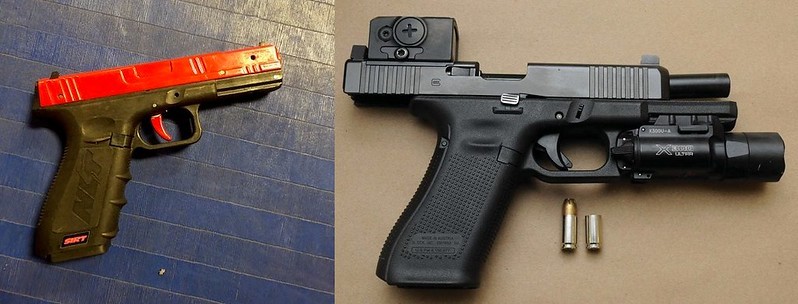Despite saying there was a likelihood of conviction, the Crown will not be laying charges after an officer fired a Glock pistol at a training officer at an Edmonton Police Service training facility in June 2019, Alberta’s police watchdog announced on Monday.

On June 12, 2019, the Alberta Serious Incident Response Team was directed to investigate the June 7 incident.
According to a news release from ASIRT, members of both the EPS Tactical Training Unit and the Firearms Training Unit were in a bullpen area of the William Nixon Training Centre at the end of their day.
“As the day was winding down, members were relaxing, throwing a tennis ball around the bullpen, and bouncing lasers from SIRT laser training pistols off mirrors and onto each other,” the release read.

SIRT training pistols resemble a Glock pistol, but don’t have a functioning barrel and don’t discharge ammunition. It emits a laser that interacts with a training vest and technology.
According to ASIRT, the top of the training pistol and the trigger are bright red, the training pistol sits differently in a holster and the grip is smooth vs. the textured grip of a Glock.
“(T)he act of drawing the SIRT pistol would feel different from drawing the duty pistol,” the release said.
The two officers involved were on separate ends of the bullpen that is divided by two rows of desks when one officer “lasered” another across the room.
“Based on the scene examination and the evidence of the various officers present in the bullpen, the involved officer responded by raising a Glock pistol and pulling the trigger, resulting in the discharge of a single live round in the direction of the other officer’s desk on the tactics training side of the bullpen,” ASIRT said.

Get breaking National news
The round hit a battering ram that was on a shelf and didn’t cause any injuries.
The involved officer declined to give evidence or a statement, ASIRT said, pointing out that is the “constitutional right of any Canadian who is the subject of a criminal investigation.”
ASIRT said evidence from others in the room at the time indicated the officer said words to the effect that he was sorry and he left to report the incident to a supervisor.
Testing determined the officer’s Glock was functioning properly.
Based on the evidence, ASIRT came to three conclusions:
- The officer mistakenly raised his Glock pistol, thinking it was the SIRT training pistol
- The officer knowingly raised his Glock pistol, thinking it was unloaded or loaded with simulated, non-lethal ammo
- The officer knowingly raised his Glock pistol and intentionally fired the gun in the direction of the officer
According to the news release, the first two scenarios would fall closer to an accident or an incident with no intent to harm, while the third scenario would constitute the “highest level of both moral and legal culpability.”
Witnesses said there was no evidence of an argument, tension, threats or “bad blood” between the two officers and the officer reportedly looked shocked, embarrassed and immediately remorseful after the shooting.
“These factors lend themselves to an inference that what occurred fell somewhere between the first two scenarios,” ASIRT said.

The case was forwarded to the Alberta Crown Prosecution Service after ASIRT executive director Susan Hughson said the evidence provided reasonable grounds for a criminal offence.
Despite the fact the Crown believed there was a reasonable likelihood of conviction, it decided it was “not in the public interest” to proceed with a criminal prosecution.
A ‘lapse in judgement’
Though no criminal charges will be laid against the officer involved, ASIRT said the evidence in the case established, at minimum, “an extremely serious lapse in judgment and carelessness in the handling of a firearm.
“There is absolutely no doubt that a different decision would likely have been made had anyone sustained injury or died.”
ASIRT points out a police officer receives “extensive training” on the handling of firearms and has broad authorities to carry and use firearms as part of the job and said lives have been lost in similar situations.
“While the evidence, including the officer’s reaction, would suggest that this incident was a devastating occurrence for him – that he never, even remotely, intended harm to anyone, and that it is not likely a mistake he will make again – the magnitude of this error cannot be understated,” the watchdog said.
According to an EPS spokesperson, the officer in question is still employed by the force, but is in a non-patrol role. The Professional Standards Branch opened a Police Service Regulation into the incident after the ASIRT investigation finished.













Comments